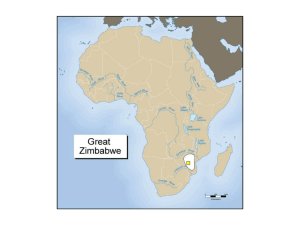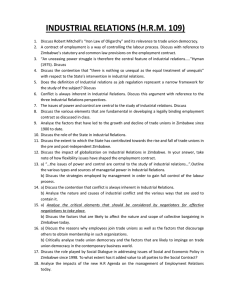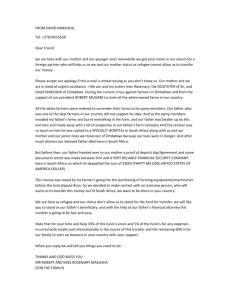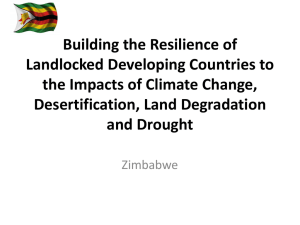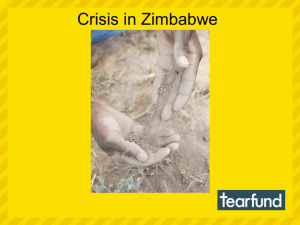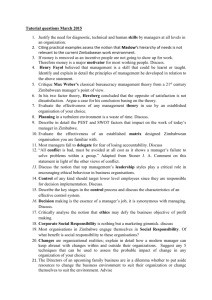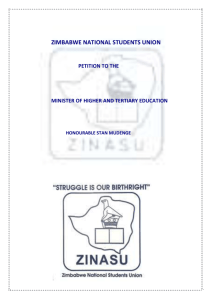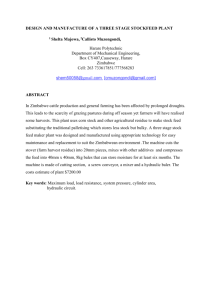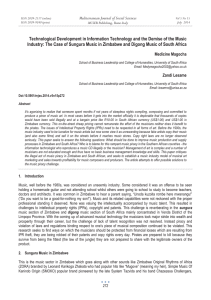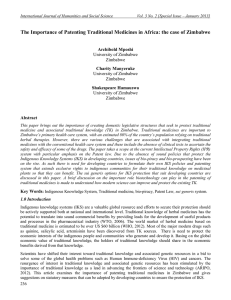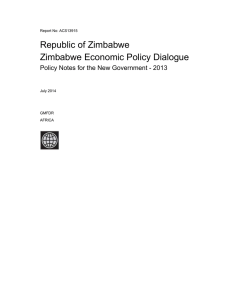intellectual property and access to information in zimbabwe
advertisement
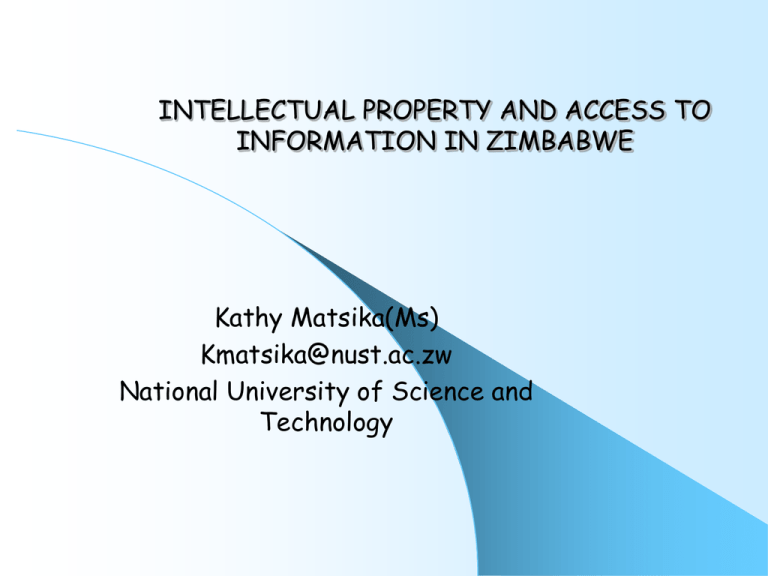
INTELLECTUAL PROPERTY AND ACCESS TO INFORMATION IN ZIMBABWE Kathy Matsika(Ms) Kmatsika@nust.ac.zw National University of Science and Technology INTRODUCTION The purpose of this paper is To give an overview of the Legal Framework for the protection of Intellectual Property in Zimbabwe. to analyze the way these impact,both positively and negatively, on information flow in general in Zimbabwe. To highlight the plight of researchers/ higher education institutions. To discuss strategies for the way forward- to promote and protect access to knowledge and information for research and innovation in academic institutions in Zimbabwe. To create an awareness of Intellectual Property issues To pose a challenge and get Zimbabwean stakeholders focused and talking to each other about copyright and IP issues in Zimbabwe PARADIGM SHIFTS Globally, changes in Intellectual Property debates reflect the growing internationalization of information issues; the WIPO DEVELOPMENT AGENDA has made WIPO meetings exciting platforms where Third World countries have managed to highlight the imbalances of the existing international IP regime. Open Access debates have taken center stage and seem to be urging society to ‘Think in other Terms’. Open Access tends to be very appealing to developing countries where demand outstrips supply because of limited resources. The internet, Electronic resources and modern technologies have changed society’s views on Copyright. The Digital Rights Management has also brought major challenges for the IP regime. How accessible is digital content or is it locked up behind technical barriers. . INTELLECTUAL PROPERTY Defined IP is divided into two categories Industrial Property: includes patents of invention, trademarks, industrial designs, geographical indications. Copyright: includes Literary and artistic works as well as creations in the field of so called “neighboring rights” or related rights. Copyright is the body of laws which grant authors,artists and other creators, protection for their literary and artistic creations- works. LEGAL FRAMEWORK Protection of IP in Zimbabwe is mainly contained in the following Acts of Parliament namely: -The Patents Act(Chapter 26:03) -The Trade Mark Act (Chapter 26:04) -Industrial Designs Act(Chapter 26:02) -Copyright and Neighboring Act(Chapter 26:08) -Geographical Indications (Chapter 26:06) -Integrated Circuit Layout Design(Chapter 26:07) ZIMBABWE INTELLECTUAL PROPERTY OFFICE The Chief Registrar of Deeds and Companies and Controller of Patents, Trade Marks and Industrial Designs runs the Zimbabwe Intellectual Property Office and is answerable to the Ministry of Justice, Legal and Parliamentary Affairs, the day to day administration of these Acts. COPYRIGHT ACT-Chapter 26:05 The current Copyright Act and Neighboring Rights was revised in 2004. The Act gives rights to authors, writers ,musical works, architectural works etc. for a period of 50 years from the year of publication. Lets hope that Zimbabwe will not extend the term 75 or more years as has happened elsewhere. Prominent feature in the revised Act is the diminishing prominence of rights to non- right holders normally given through ‘limitations and Exceptions’ -’Fair dealing for purposes of research or private study’ For Librarians, the most important section of the Copyright Act is the ‘Exceptions and limitations’, the section which extends limited rights to the people as consumers of information. CHALLENGES FACING zulc: PHOTOCOPYING in University Libraries- how much is allowed. Who does the policing? Libraries not responsible for what the users do? Collection Building- scarce and expensive foreign titles Lack of awareness of IP issues in Institutions of Higher Education Mistrust – Right holders, Users, institutions Collecting Societies- lack of transparency,what happens to money collected for authors not in /fro Collecting societies-Who and where are they Absence of clear directions from the Authorities Attraction of the Open Access Approach Licensing STRATEGIES Lobby the relevant sections of the Ministry of Justice, legal and Parliamentary Affairs and Legislators to consult Librarians and Information workers in future revisions of the Copyright Act. In the previous revision 2004, Information people were not. Seek clarification on the issue of ‘fair use’ in the Copyright Act. What rights does it give to non right holders? Dialogue with the proposed Collecting Societies for clarification on hoe they are Create awareness in Zimbabwe on the ‘access to information’ as a right Work closely with partners in the region and worldwide to get information necessary to develop cutting edge relevant intellectual property policies and practices. CONCLUSION :ZULC LOBBY • Broadly speaking, Librarians are law abiding citizens and they are aware that Infringement of copyright by universities may result in legal action and possible awards of damages. In fact, Librarians support copyright but would want it understood that in developing countries like Zimbabwe, there is need to strike a balance . • ZULC advocates for equitable and practical copyright environments. ZULC to build capacity and expertise among its members in advocacy for equitable Copyright Laws, to lobby the powers that be to revisit the current Copyright Act in order to redress the balance – maintain adequate protection of right holders and ‘fair dealing’. • ZULC and Access to Information ZULC is working towards establishing an ideal environment in which all people are able to access and contribute information and ideas leading to toward the total development of the Zimbabwean society. University Libraries, with assistance from international partners and in line with the Association of African Universities facilitate access to local research literature through the creation of local and regional databases. THANK YOU KATHY MATSIKA(Ms) kmatsika@nust.ac.zw

